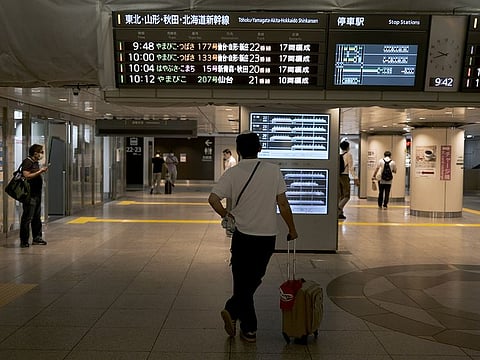Airlines have one message for travellers: 'Keep the masks on'
Industry group repeats warning on face coverings after 'some' incidents turned violent

Also In This Package
Dubai: Passengers catching a flight in the coming weeks and months will need to have their faces covered right through the journey, warns an airline industry grouping.
It comes after a few cases of on-board incidents turning violent as these travelers refused instructions on face coverings, “resulting in costly and extremely inconvenient diversions to offload these passengers,” IATA (International Air Transport Association) notes.
“This is a call for common sense and taking responsibility,” Alexandre de Juniac, IATA’s Director-General and CEO. “The vast majority of travellers understand the importance of face covering both for themselves as well as for their fellow passengers, and airlines appreciate this collective effort.
“But a small minority create problems. Safety is at the core of aviation, and compliance with crew safety instructions is the law.
“Failure to comply can jeopardize a flight’s safety, disrupt the travel experience of other passengers and impact the work environment for crew.”
The warning comes as more airlines relaunch services to more routes, but at a time when COVID-19 related cases are again showing signs of a fresh increase in some regions.
A health warning
Wearing face coverings is a key recommendation of the International Civil Aviation Organization’s (ICAO) guidance for safe operations during the pandemic, as developed jointly with the World Health Organization and governments.
Failure to comply means that a passenger faces the risk of being offloaded, having restrictions on future travel, or penalties under national laws.
A plane ticket is a contract under which the passenger agrees to the airline’s terms and conditions of 'carriage'. These can include the airline’s right to refuse carriage to a person whose behavior interferes with a flight, violates government regulations or causes other passengers to feel unsafe. Airlines have routinely highlight the need for a face covering during the booking process, at check-in, at the gate and in onboard announcements.
“The research we have seen to date, and our own investigations with the world’s airlines, tell us that the risk of catching COVID-19 on a flight remains very low," said Dr. David Powell, IATA’s Medical Advisor. "There appears to be a number of factors supporting that.
"The high flow rate of cabin air from top to bottom, constant filtering of air through state-of-the-art HEPA filters, the fact that all seats face the same direction and of course wearing a face covering and sanitization of the aircraft all play a part.”
Sign up for the Daily Briefing
Get the latest news and updates straight to your inbox









